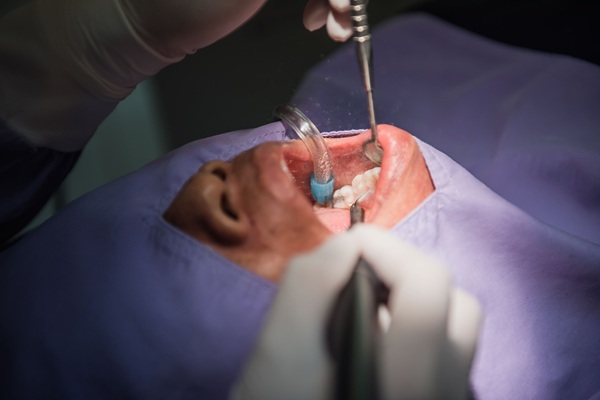How Long Does It Take to Recover From a Typical Oral Surgery Procedure?

Most people will need some type of oral surgery at some point in their life. Many general dentists offer surgical procedures to their patients, such as removing impacted wisdom teeth. Being familiar with the process and understanding the recovery period helps the patient have a more comfortable and successful procedure.
About oral surgery
Some of the common reasons a patient needs to undergo oral surgery include the removal of an impacted tooth, wisdom tooth extraction, and dental implant placement. Whatever the reason, the patient should learn as much as possible about their procedure and ask their dentist many questions. This way, they can be ready and set themselves up for a successful procedure and recovery.
Recovering from oral surgery
Oral surgery patients need to closely follow the recovery instructions their dentist gives them to help ensure the success of their procedure. By following their dentist's aftercare instructions carefully, their recovery process will likely go smoothly. The should also read the instructions thoroughly, so they are aware of any complications they must watch out for. Examples of some of the instructions a dental patient may need to adhere to after undergoing oral surgery include complete resting for 24 to 48 hours, eating only soft foods for up to a week, using a cold compress to help minimize any swelling, taking over-the-counter and/or prescribed medications, avoiding consuming any alcohol for a certain amount of time, and avoiding smoking.
One of the more common questions patients have is how long it will take them to recover. The answer depends on the type of surgery they had and how well they followed their recovery instructions. For instance, recovering from impacted tooth surgery takes three to seven days. When it comes to removing a problem wisdom tooth, recovery can take up to two weeks. Since dental implants are surgically inserted into a patient's jawbone, the time it takes to recover from this type of procedure tends to be somewhere between four and six months. If a patient happens to experience any complications during the surgical procedure, it will often take them longer to fully recover.
While many patients are not concerned about how long it will take them to recover, others are concerned because they need to get back to their everyday responsibilities. Patients can do a few additional things to encourage faster healing, such as only eating healthy foods, drinking plenty of water throughout the day, getting plenty of rest, limiting activity, and carefully massaging the treatment area to increase blood circulation.
The bottom line
Patients undergoing oral surgery should understand their procedure and what they need to do to help themselves have a successful recovery. A general dentist can answer any questions the patient has about their procedure and provide them with the information they need to get ready for the surgery and take care of themselves after. For more on recovery from oral surgery, contact our Rosharon office today.
Request an appointment here: https://arcolaprosthodonticsandimplantcenter.com or call Arcola Dental Prosthodontics & Implant Center at (281) 595-1033 for an appointment in our Rosharon office.
Check out what others are saying about our dental services on Yelp: Oral Surgery in Rosharon, TX.
Related Posts
Dental veneers create a brighter, more uniform smile and often help correct cosmetic concerns that make teeth look uneven or worn. Many patients want improvements that look natural while still enhancing confidence in everyday settings. Veneers offer a versatile option for refining color, shape, and symmetry in some cases without extensive orthodontic treatment. A dentist…
Tooth implants have become a popular replacement option for individuals with missing teeth. Also known as dental implants, this replacement option is one that requires a semi-invasive oral surgery. The term oral surgery often sparks fear in individuals due to the potential for pain; however, what is important to know is that tooth implants are…
Dental bone grafts restore structure and strength to the jawbone. Not only does this enhance the natural appearance of the face, but it can also create a strong foundation for dental implants. There are several types of dental bone grafts that an oral surgeon may recommend. Exploring the various types available can better prepare patients…
Dental crowns are widely used to restore damaged or weakened teeth, providing durability, strength, and a natural appearance. A dental crown can last many years with proper care, but it may face complications over time, like any dental restoration. Understanding these common issues and how to address them can help patients maintain their crown's health…
